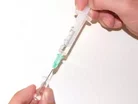New cervical cancer jab protects against genital warts

An HPV vaccination programme available to schoolgirls throughout the UK will also protect against genital warts from September 2012.
Gardasil, supplied by Sanofi Pasteur MSD and manufactured by Merck, is going to be the new vaccine used from next year, replacing GlaxoSmithKline’s Cervarix which is currently used.
Although both vaccines protect against the two most common strains of cervical cancer, types 16 and 18 of the human papilloma virus (HPV), Gardasil also gives protection against HPV types six and 11, the cause of the vast majority of genital warts.
The decision to make the change follows a competitive tender exercise and after new research published in the British Medical Journal revealed that Gardasil was more cost effective than Cervarix.
To read the latest edition of Healthcare Global, click here
- New air filter improves symptoms for asthma sufferers
- HIV positive doctors and dentists to practice in the UK
- ‘Sleep texting’ cases are increasing due to stress
The Director of Immunisation for the UK government, Professor David Salisbury, said: “From next September, Gardasil will be the vaccine that we offer to girls to protect them against the HPV infection.
“It’s not unusual for the NHS to change vaccines or other medicines – it can happen following competitive tendering exercises or when new research findings come to light.
“Young women and girls who have already been vaccinated or who are due to be vaccinated before September do not need to be vaccinated again.
“They have done exactly the right thing and they can be assured that they are protected against types of HPV virus that cause over 70 per cent of cervical cancer,” he added.
“We have one of the best HPV vaccination programmes in the world and we want that success to continue.
“It will be tremendous to see rates of cervical cancer falling. The number of women getting abnormal results from HPV screening will also fall.
Salisbury also commented: “Many women will no longer have to live through the worry and stress of follow-up after screening, including treatment for precancerous lesions.”
Since 2008 when the HPV immunisation programme was introduced, 1.5 million girls, mostly aged 12-13 have been vaccinated against HPV and cervical cancer.
Our magazine is now available on the iPad. Click here to download it.
